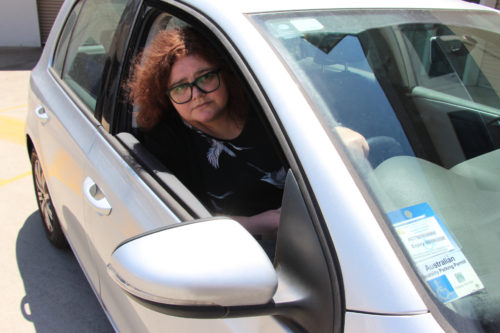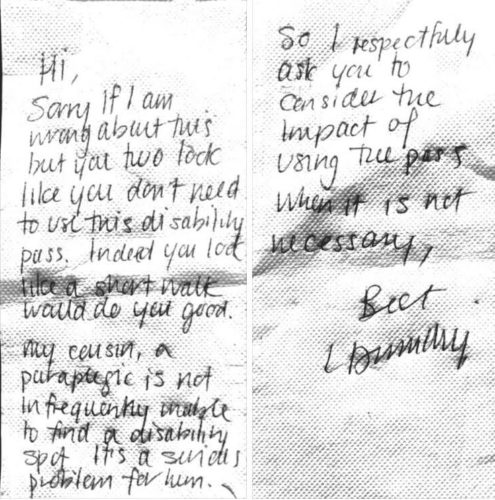
DANIELLE NOHRA reports on an ugly and intimidating side of our community where people with disabled parking permits get abused for looking ‘normal’.
DAYS chronic health sufferers are in the most pain are often the ones they experience discrimination and abuse for using their disability parking permits.
This was the case for Janet Ewen, 48, of Curtin, who looks fine on the outside despite suffering from type 2 respiratory failure, psoriatic arthritis and other chronic health issues.
Her “invisible” disabilities forced her to get a disability pass about four years ago to help on the days (which is more times than not) she’s feeling really unwell.
But what was initially supposed to be something to help her, sees her faced with anxiety when using her pass.
“[About a year ago] at an underground car park in Fyshwick, a man came up and was yelling at me through the window,” Janet says.
“He was implying that I didn’t have a disability and I shouldn’t be parking there.
“I said to him: ‘You don’t know that I’m not dying from cancer or what’s wrong with me’.”
Not only did that incident leave Janet feeling really upset but it also made her feel guilty for parking there when she had every right to.
What’s even more frustrating is that when Janet’s mother, who has a slight limp from a past knee reconstruction, is with her, she doesn’t get a second glance because Janet believes people think the pass is for her.
But when Janet’s on her own she says people always come up to the window and check to see that she’s got a pass.
“I often don’t feel like I can use it and often take other car parks so other people can use the spot,” she says.
“I don’t like using it, but there are days when I definitely need it.
“Just because someone’s not in a wheelchair doesn’t mean they don’t need a disability parking space.
“People need to be more understanding and mindful that other people are suffering, even though they may not look that way.”
‘You look like a short walk would do you good…’
ANOTHER woman, Karen Castro, who also has a chronic “invisible” illness told “CityNews” she has experienced abuse and has been made to feel very uncomfortable on multiple occasions for parking in a disabled car park.
Karen first became ill in her late 20s after getting glandular fever, which led to myalgic encephalomyelitis, commonly known as chronic fatigue syndrome, a poorly understood condition, she says.
Although Karen struggled (and still struggles) to do many things, she never thought a disability permit was even an option.
“I didn’t have it initially. I assumed because I didn’t have a wheelchair that I didn’t need one,” says Karen, 33, of Gungahlin.
“I started parking in short-term parking spots and would risk getting a parking fine.”
But when Karen’s work moved offices and the new one was a 400-metre walk from the carpark to the office, things became complicated.
“I would have to sit in my car for 30 minutes to recover enough to be able to drive home safely,” she says.
Following the move Karen was granted a temporary disability parking permit, which gets reviewed every few months, and as she increasingly gets better, she hopes she won’t have to use it for much longer.
She says it’s been essential for her and she wishes people would understand that she wouldn’t use it if it wasn’t necessary.
“People that have challenged my eligibility for the pass have usually been quite confrontational,” she says.
“The angry outbursts or passive-aggressive notes create additional stress that is not needed when I’m already trying to manage everything as best I can.”

On one occasion in particular, Karen found a “passive-aggressive” note on her car, which said: “Hi, sorry if I am wrong about this, but you two look like you don’t need this disability pass. Indeed, you look like a short walk would do you good. My cousin, a paraplegic, is not infrequently able to find a disability spot. It’s a serious problem for him. So I respectfully ask [that] you consider the impact of using the pass when it is not necessary.”
Experiences such as this one have affected both Karen and her partner, and she says she often weighs up whether the physical relief the pass provides is worth the cost of a possible confrontation.
Karen took to Facebook to repost the letter left on her windscreen.
“It was very upsetting, it was very hurtful and it was something I didn’t need on that day,” she says.
‘They give those stickers to anyone these days…’
MORE people live with an invisible disability than a visible one, says Arthritis ACT CEO Rebecca Davey, who believes there needs to be more awareness around people living with invisible disabilities, especially when it comes to parking permits.

There are almost 25,000 active mobility permits, and 1450 dedicated accessible parking spaces in public and ACT government car parks, according to an Access Canberra spokesperson.
Rebecca says they often hear regular stories from Arthritis ACT members about people being pointed at or “spoken at” when they use the disability permits.
She hears of people being told that “you clearly don’t have to be that disabled to get one of those stickers” or “they give those stickers to anyone these days”.
“Sadly it’s more often in places like hospitals and medical service car parks than in general community car parks,” Rebecca says.
“It tends to be younger people that are at the receiving end of these behaviours, too. It’s almost as if, as a society, we expect older people to have an invisible disability, or just the society belief that ‘you’re old so you must be disabled’ (which of itself is wrong) [and then people think that] younger people are not meant to have an invisible disability.”
There seems to be a stereotype around the typical disability parking permit user and Rebecca wonders if the symbol for disabled car parks should be associated with another image rather than a wheelchair.
“I know personally, living with a child with a disability, I’m actually less likely to use a disability car park when I have her with her wheelchair than when I have her without her wheelchair, and that’s because we can do distance with the chair,” she says.
“But if she is having to mobilise without her chair, then we usually need to get closer to the destination to allow that to happen.”
Rebecca says people living with an invisible disability are trying to get on with their life, and recommends people donate to the “Big Issue” or offer to buy a meal for someone who is homeless, rather than give someone, who they know nothing about, a hard time.
“Go home and read up on invisible disabilities,” she says.
“At the end of the day it’s really, really hard to get a disability parking permit, so if a medical practitioner has deemed someone to be in need of one and they have jumped over the hoops required, then they actually deserve it.”
Who can be trusted?
In a world of spin and confusion, there’s never been a more important time to support independent journalism in Canberra.
If you trust our work online and want to enforce the power of independent voices, I invite you to make a small contribution.
Every dollar of support is invested back into our journalism to help keep citynews.com.au strong and free.
Thank you,
Ian Meikle, editor





Leave a Reply